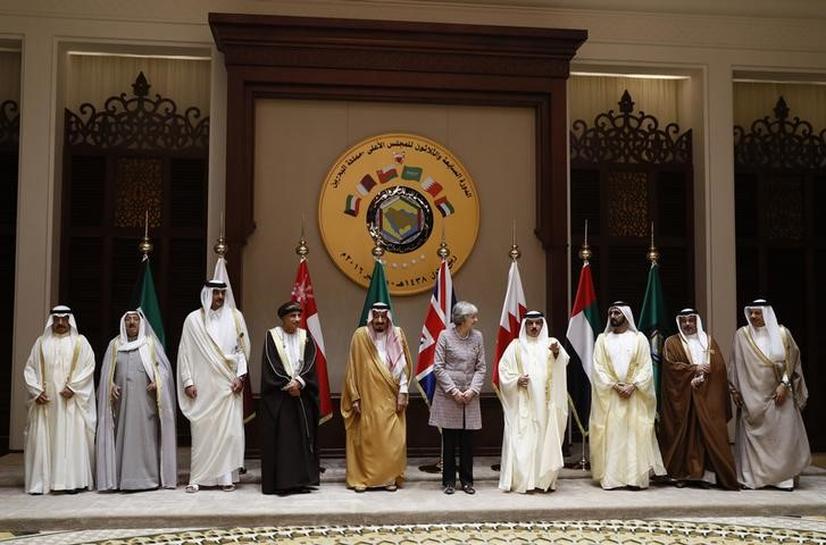Time to re-energize the GCC-UK strategic partnership
https://arab.news/ggu5a

When the UK finally exited the EU in January, it accelerated its efforts to enhance the relationships it had already cultivated with other countries and blocs, including the Gulf Cooperation Council (GCC). Since 2016, the GCC and UK have engaged constructively in many areas, including political, security and economic cooperation, at both the bilateral and collective GCC levels, most recently on combating the novel coronavirus disease (COVID-19) pandemic. However, the pace of that partnership needs to be accelerated, despite the health challenges.
Building on historical ties and a robust trading relationship that goes back centuries, the GCC and UK are now seeking to establish a free trade area, where goods are exchanged with lower tariffs while services and investments are given preferential treatment.
In December 2016, then-Prime Minister Theresa May met with GCC leaders in Bahrain in the first GCC-UK summit. May proposed the establishment of a UK-GCC Strategic Partnership. The summit communique that announced the new partnership stressed the two sides’ political and security cooperation, trade and investment ties, and cultural and social engagement. It also signaled greater coordination in humanitarian and development assistance programs, as well as cooperation on refugees, migration and combating human trafficking.
With the UK leaving the EU, it has begun to cultivate new trade agreements. When the transition period ends on Dec. 31, EU arrangements will no longer provide Britain with market access to other countries and trading blocs, and Britain has to find alternatives. The GCC is one of the most important markets for British exports and it has the potential to provide greater access when a trade deal is concluded. In 2019, GCC-UK trade in goods and services exceeded $55 billion, while the stock of investments is estimated in the tens of billions. The GCC is the third biggest destination for British exports after the EU and the US. The UK is negotiating trade deals with the EU and US, and is now also exploring one with the GCC.
When the free trade agreement (FTA) is concluded, it would create a substantial $4 trillion market, where goods and services are exchanged with minimum hassle and investors are encouraged to expand their markets. Britain has been, for some time, a favorite destination for GCC investors, students and visitors. It is estimated that about 1 million GCC visitors go to the UK annually, making it their top European destination. Much more work is needed, but it is encouraging that the two sides already enjoy a strong foothold in each other’s market. British brands and investments have a solid presence in the GCC region despite stiff competition from other sources. About 500,000 Britons live in the Gulf, half of them in the UAE alone, while many more regularly visit the region.
For this trading partnership to flourish, with or without an FTA, other aspects of the GCC-UK Strategic Partnership need to be bolstered. First, political dialogue and security coordination need to be more open and regular. It is normal for the two sides to have different views on political or regional security issues. The 2016 GCC-UK summit established multiple channels for dialogue, but they need to be utilized more regularly and reliably.
Second, people-to-people engagement needs to be facilitated more. It is still difficult for most GCC nationals to enter Britain to study, invest, receive medical care, or just for tourism. UK visas are among the most difficult and expensive to obtain. Student and scholar exchanges also need to be facilitated more. To increase student exchange, GCC students seeking admission to British colleges need more help to match them with the right universities. Scholar exchanges are quite limited despite the fact that many professors at GCC universities graduated from prominent British universities. Independent artists and writers face greater challenges in moving and working in the two realms.
Much more work is needed, but it is encouraging that the two sides already enjoy a strong foothold in each other’s market.
Abdel Aziz Aluwaisheg
Third, Britain and the GCC need to coordinate more on regional security, stabilization and development. Both are interested in providing humanitarian and development assistance to countries in need in this region, and aid coordination does exist between them, albeit at a limited level. They also have a common interest in restoring peace and stability in countries in conflict. They will benefit from regular consultations on these issues.
With Brexit finally happening, there is now more certainty in Britain after a few years — following the 2016 referendum — of lingering questions about its relationship with the EU and the rest of the world. Despite COVID-19 worries, now is the time to resume regular joint work between the GCC and UK to put more flesh on the bones of their strategic partnership.
- Abdel Aziz Aluwaisheg is the Gulf Cooperation Council’s assistant secretary-general for political affairs and negotiation, and a columnist for Arab News. The views expressed in this piece are personal and do not necessarily represent those of the GCC. Twitter: @abuhamad1









































